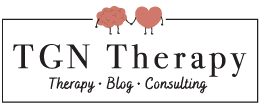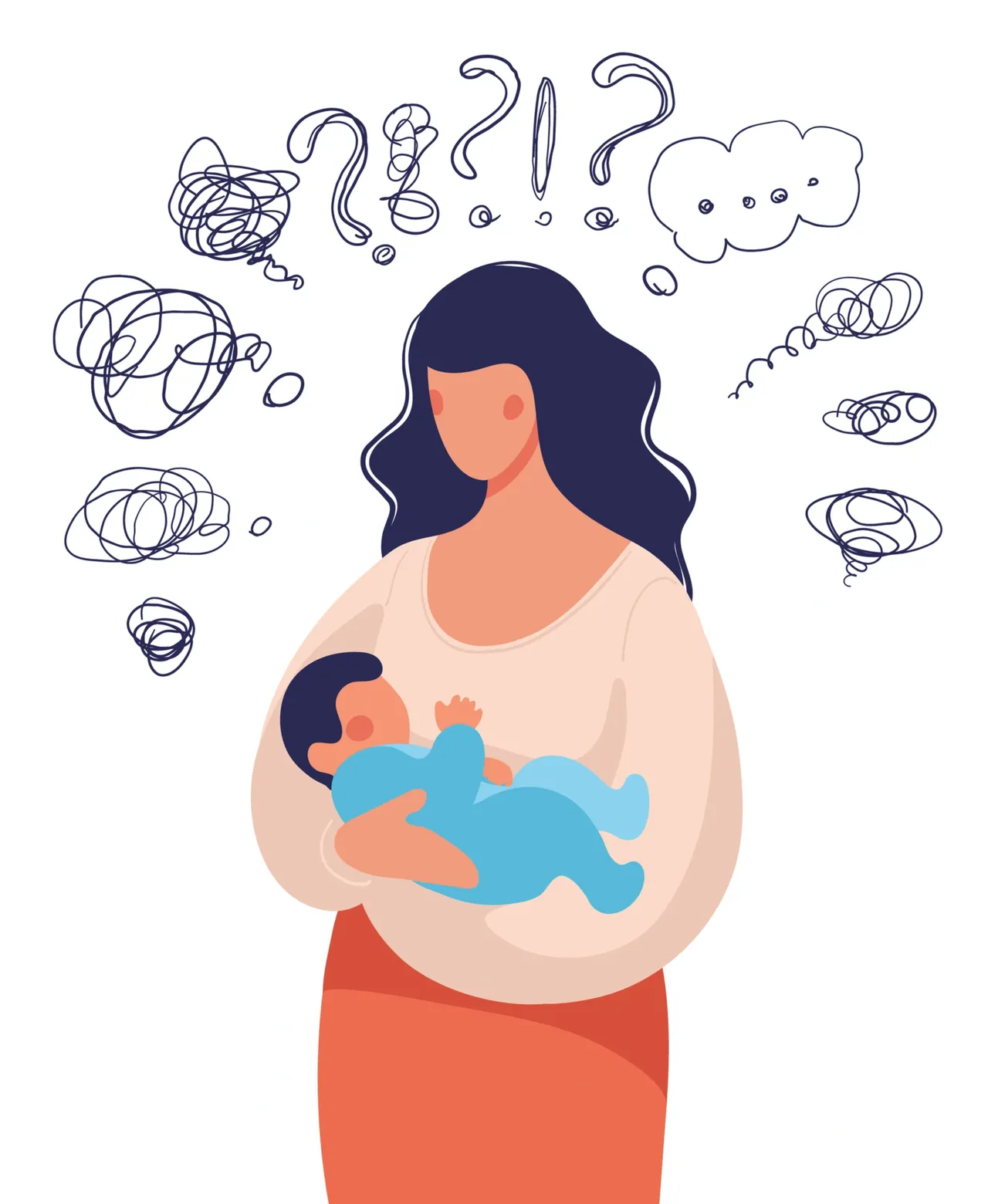Hi everyone!
Today’s post features my first blog guest, Jenna Overbaugh, LPC, CPT. Jenna is a Licensed Professional Counselor, Certified Personal Trainer, and mama. Jenna has a private practice in Waukesha, Wisconsin, and works as a therapist at NOCD—a mobile platform offering telehealth to people living with Obsessive-Compulsive Disorder (OCD). She specializes in treating OCD and anxiety, and is passionate about maternal mental health. She writes candidly about her clinical experience, as well as her personal experience with postpartum OCD and anxiety, after the birth of her first child, Eli.
This one is for all the mamas (new and seasoned) who have previously or are currently experiencing debilitating anxiety. Jenna is here to normalize this experience, share how she has been able to better manage her own anxiety, and explore insights on this taboo topic.
Let’s get started!
You’d think that as a therapist specializing in OCD, I would have this whole “anxious mom” thing under control. Well, guess what? I don’t—and I often find myself struggling, too.
I’m here to shout from the rooftops that OCD doesn’t discriminate and can truly affect anyone, even someone with 12+ years of OCD specialized treatment experience under their belt—someone like me. I wish someone would have told pre-mama-Jenna about the changes that occur during the pregnancy and postpartum periods. I wish I knew how many women struggle with intrusive thoughts about harming their baby, how hard it is to be a new parent, and how unlike myself I would feel. Had I known these truths, I probably would have felt better prepared, more rational, and less like I was losing my mind.
Here’s the truth: I spent the first 1.5 years of my son’s life barely coping with OCD and anxiety, while trying to put on a brave face and help others who were also experiencing debilitating OCD and anxiety. I found myself caught in the cycle of wondering. Is this how motherhood is? Do I just need to deal with it? Am I crazy?
Here’s what I want you to know: many women experience postpartum anxiety and/or postpartum OCD, AND you do not need to “just deal with it”.
Obsessive-Compulsive Disorder occurs when a person experiences obsessions (thoughts) and/or compulsions (repetitive behaviors), in such a way that it impacts their functioning. Some common impacts include social or family relationships, occupational or school functioning, or the ability to do activities of daily living, such as eating, showering, dressing, etc.
Obsessions are intrusive thoughts, ideas, images, or impulses that happen repetitively, and are inconsistent with a person’s values. Some common obsessions that new moms often experience, include thoughts or fears of harming their baby—either accidentally, or purposefully.
Moms may have thoughts of throwing their baby down the stairs or putting them in the oven, and/or fears of sexually or inappropriately touching their baby. Additional intrusive thoughts may include constantly worrying about health, safety, and contamination, and feeling as though the baby needs to be constantly checked.
It’s important to note here that research suggests we all have intrusive thoughts. It’s not necessarily the thoughts themselves that are problematic, but, rather, the meaning assigned to them. For instance, someone with OCD may experience an intrusive thought, take responsibility for the thought, negatively judge the thought, and want to stop the thought. This is because intrusive thoughts are egodystonic, meaning they are inconsistent with our values and cause us distress; we have awareness that something is off. This means a mom can have intrusive thoughts about harming her baby AND feel extreme anxiety about these thoughts, want the thoughts to go away, and NOT actually want to harm her baby. Thoughts do not equal feelings or actions. Therefore, this DOES NOT mean that a mom who has intrusive thoughts is a monster or does not love her baby. In fact, it usually indicates the opposite, because OCD latches onto what we care about most (OCD, you sneak!).
Compulsions are repetitive behaviors that are often utilized in an attempt to alleviate the discomfort and disturbance associated with the obsessions. Compulsions for new moms may look like avoidance, self-assurance, checking, or asking for reassurance from others. Specific examples may look like avoiding stairs or other high areas while holding the baby, repeatedly checking to make sure the baby is breathing, and not allowing the baby to be cared for or held by others.
Giving into these compulsions can temporarily alleviate anxiety, however, moms who give into them will learn to rely on these behaviors and engage in them more frequently. Thus, causing anxiety for moms to grow bigger, while their world shrinks smaller and smaller. What helps temporarily, can actually hurt long-term.
New moms experience obsessions and compulsions in different ways, but there is one factor that is commonly universal; postpartum anxiety and OCD is still taboo, and therefore, rarely talked about. Not talking about it leads to the perpetual cycle of other new moms believing that they’re the only ones who have these thoughts. They feel isolated, alone, and oftentimes, insane, so they avoid talking about it. The shame associated with postpartum anxiety and OCD is hard to escape, further fueling the negative thoughts women have about themselves and their capabilities.
Research shows that the vast majority of individuals experience intrusive thoughts—thoughts that are not aligned with their values, even if they do not necessarily have diagnosable OCD. Research also supports that new moms are particularly vulnerable to experiencing an increase in intrusive thoughts, perhaps because of hormonal changes, the stressful life event of having a baby, identity changes, and overall adjustments that come with being a new or repeat parent.
Obsessive-compulsive tendencies also tend to latch onto uncertain situations when a person feels particularly responsible for someone or something. Enter MOTHERHOOD (right!?). Nothing is more scary or uncertain than having a newborn, because moms are not only dealing with a tiny, new human (human, or alien?), but they’re also adjusting to their postpartum body and associated changes—both of which are rarely talked about before, during, and even after pregnancy.
I can’t communicate with them.
How are they doing?
Is this normal?
Are they healthy?
What’s happening to my body?
Am I a bad mom?
The weight of the responsibility we feel for our children is heavy, and this is the perfect mixing pot for obsessions and compulsions, making a delicious recipe for extreme anxiety, distress, and depression (yum!).
I experienced obsessions in the form of thinking I would accidentally or purposefully harm my baby. I worried that I would snap his ankles by putting his socks on—a simple task, that is unlikely to cause any harm. Logically, I knew better, but the fear was too big. I asked my husband to take over this task so I didn’t have to experience the discomfort, anxiety, or intrusive thoughts of snapping my newborn baby’s ankles.
I also had intrusive thoughts that I would accidentally leave him in parking lots or other public places. Even when I could clearly see him in my rearview mirror and hear him snoring or laughing, I would have to pull my car over onto the side of the road to physically touch him. I had to be 100% certain that he was there and that I did not forget about him, because my brain kept playing tricks on me.
I felt like I was going crazy. On some level, I knew this didn’t make sense, but it still felt so real and my fears were about my baby—the most precious thing. How could I sit with any uncomfortable feelings, or uncertainty regarding his safety? I didn’t realize that by engaging in all of these behaviors, I was becoming sicker and sicker and my grip on reality was slowly slipping away.
I was fearful of being alone with my son for more than 2 minutes at a time—even when my husband would leave to use the restroom, because I was worried that something bad would happen to him on my watch. I wasn’t able to enjoy my son, and I wasn’t able to enjoy being a mom.
Instead, I was in crisis and desperately needed to change the way I was living, because I just couldn’t live like that any longer.
I knew that despite all of my education, training, experience, and expertise with OCD and anxiety, I needed support. For the first time, I reached out to a therapist. I felt embarrassed that I, the expert, needed therapy, which of course, only led to further guilt and shame. My therapist was warm and nonjudgmental. She provided me a safe place where I could air out my distorted thoughts while also challenging myself behaviorally at home. I got to the point where I had to practice putting socks on my child, and I gradually started having time alone with him, without asking my husband where he was or when he would be home. Slowly, I felt safe enough to take him out of the house, and resist rituals like checking, reassurance, and asking my husband to bail me out.
Anxiety still grips at my heart from time to time. During the pandemic, dealing with a toddler and a new work-from-home-job has been significantly challenging for me. I still have days where I struggle. I still feel anxious in the car; I still doubt my abilities. But, I have also developed techniques that help me to cope. I’ve come to realize that anxiety is a part of me, and without it, I would not be able to survive, because anxiety is my body and mind’s way of communicating to me; my internal danger signal.
What I’ve learned is that there’s a difference between anxiety that helps us, and anxiety that inhibits us. Previously, my internal danger signal was overly sensitive, which did not do me (or those around me) any good; instead, it caused harm. I now know that when it comes to the journey of my life, I’m in control. OCD and anxiety do not dictate how I spend my time with my son or my family, or how I live my life. OCD and anxiety do not define me—not as a mother, wife, therapist, or human.
For any other mom going through this, here’s what I want you to know:
1. You are not alone
2. You are not crazy
3. You are not a bad mom
4. You and your family deserve better
5. You can have a life, where you are not a prisoner to your anxiety
6. There is treatment available
For day-to-day tips, encouragement, and advice, check out my Anonymom series on my podcast, All the Hard Things, where I interview moms anonymously about various difficulties they experience, including postpartum OCD and anxiety. I talk extensively about OCD and anxiety in motherhood, in the first episode. In this episode, I also review some of my favorite resources and books for moms who are struggling with intrusive thoughts including “Good Moms Have Scary Thoughts” and “Dropping the Baby and Other Scary Thoughts”, both by Karen Kleinman.
For more information and resources on OCD, head to the International OCD Foundation. You can also head to Postpartum Support International, for additional motherhood information, education, and resources.
To learn more about Jenna, visit her website and connect with her on social media.
Click here for additional maternal mental health resources.

Written by Jenna Overbaugh, LPC, CPT


